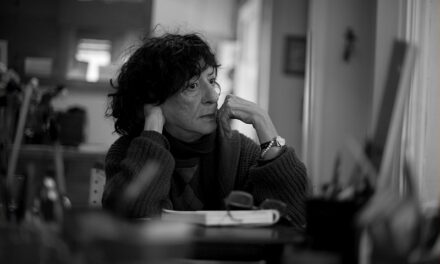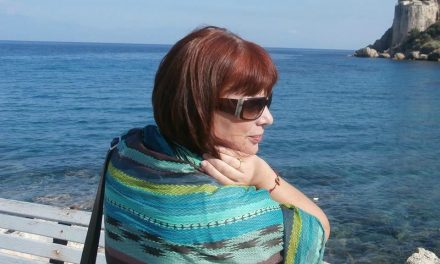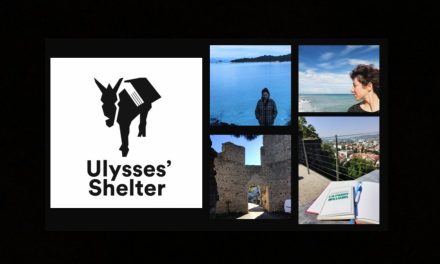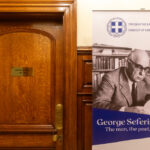Easter, or Pascha in Greek, is the most important religious holiday of the Orthodox Church marking the resurrection of Christ and the chance of rebirth for mankind. Easter holds a special place in the heart of Greek people, and has been the theme of many poems by significant Greek poets, such as Dionysios Solomos, Odysseas Elytis, Nikos Kazantzakis, Kostis Palamas, Angelos Sikelianos, Nikos Gatsos, Tasos Leivaditis, Giannis Varveris, Kiki Dimoula, etc.

The six songs of the Holy Week sequence, Days of the Epitaph by Nikos Gatsos are a tribute to Christ. The poet feels that Christ’s sacrifice was the ultimate manifestation of God’s love for people. All six songs are interspersed with frequent quotations, sometimes slightly modified, from the Bible and other religious texts, expressing the poet’s conviction that Christ is the only hope for mankind.
In “Holy Monday” the poet uses quotations from the New Testament and the Holy Monday mass to profess his belief that the coming one is “the Alpha and the Omega” (Revelation 1:8), “the architect of the infinite, the shepherd of the stars.” Christ, anticipating his death, asks his mother to wait for him near the well of the abyss, by the gates of heaven.
In “Holy Tuesday” the poet again uses quotations from the poem of the nun Kassiani which is part of the Holy Tuesday mass and presents an antithesis between Christ and those who spoiled love. While in many of his songs love is unrequited, here he sheds a different light on the subject of love and sensual pleasure. The song, though, ends on a note of affirmation, the words of Christ “I have come as a light into the world, so that whoever believes in Me should not abide in darkness.”
In “Holy Wednesday” the poet again uses imagery and quotations from the Revelation and more specifically from the part that presents the conflict between the celestial forces and the demons and the defeat of the evil spirits. The poet points out that the time to honour the savior has come and recalls Saint Paul’s message of Love (Corinthians 15:13): “Faith, Hope, Love. These three. Love the greatest of all.”
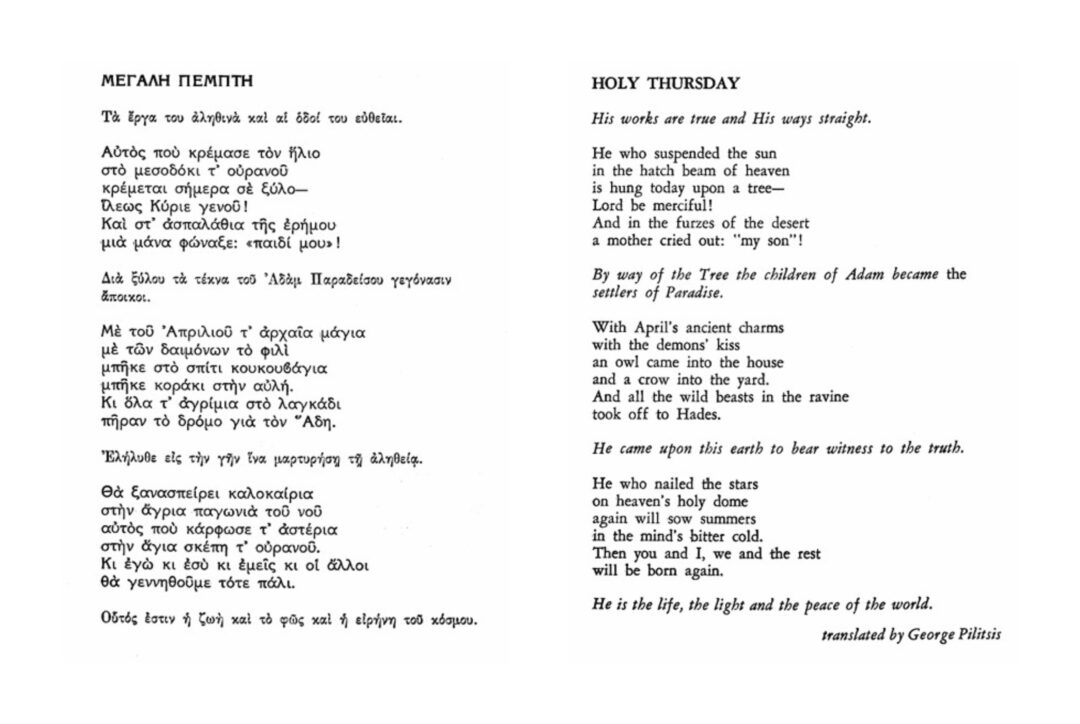
In “Holy Thursday,” the day of Christ’s death, the poet starts with a note of praise, “His works are true and His ways straight” and continues with another quotation which points out that Christ’s crucifixion made it possible for the children of Adam to return to Paradise from which he was expelled. The poet expresses the hope that all people on earth will be born again. The song ends with the most important among the quotations, in which Christ personifies peace: “He is the life, the light and the peace of the world.“
“Holy Friday” is the day of the epitaph and of the expression of deep sorrow. The quotations the poet uses in his song of that title are from the Holy Thursday mass, Holy Friday mass and the Revelation. He addresses Christ as “the first among the first” and “the greatest of the great” and he offers lilies of the Spring, laying them on the cross. The poet sees the day of Christ’s burial as the day that “Hades opened up” and “Calvary became a bridge” between Hades and Earth.
In “Holy Saturday” the poet conveys this feeling of mourning by creating an atmosphere of sterility where the doves fly slowly over thirsty gardens and fields. The six songs of the Holy Week sequence are not followed, as one would have expected, by “Easter Sunday,” the day of Resurrection. In fact, in another of his poems “Song of Old Times,” Gatsos writes that “Resurrection will be long in coming,” meaning a symbolic resurrection with people themselves bringing peace to the earth.
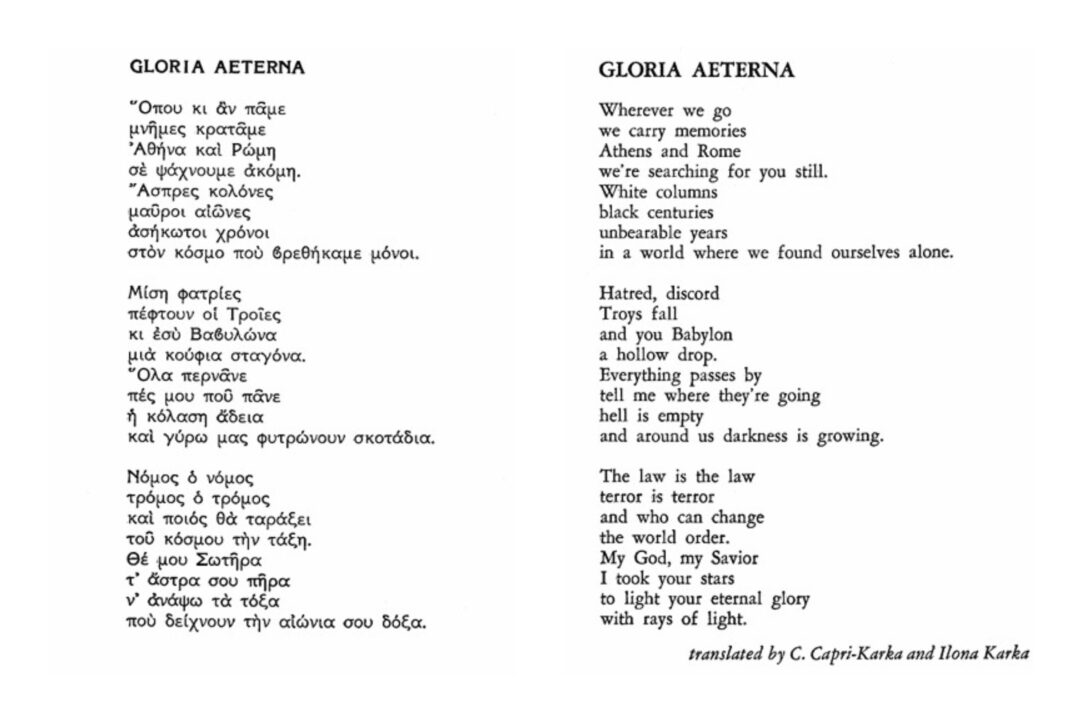
Instead, what follows after “Holy Saturday” is “Gloria Aeterna.” In this song Gatsos, after a retrospective look at the past, referring to the Greek and Roman civilizations that have almost disappeared and to the chaos of Babylon, mentions the enmity among people and portrays the world in dark colours. Thus he implies that the sacrifice and resurrection of Christ did not much change the face of the earth, as it should have, and did not abolish hatred and discord among men. However, the poet ends the song by professing his own faith. He addresses God and he wants to use God’s stars “to light [His] eternal glory / with rays of light.”
The Poet
Poet, lyricist critic and translator, Nikos Gatsos stands apart in the annals of Greek literature. He was born in the village of Asea, in Arcadia in the Peloponnese, and went to school in Tripoli and Athens. By the time he entered the University of Athens to study philosophy he was already a fluent speaker of English and French. In Athens he came into contact with literary figures, particularly the poet Odysseus Elytis, with whom he formed a life-long friendship.
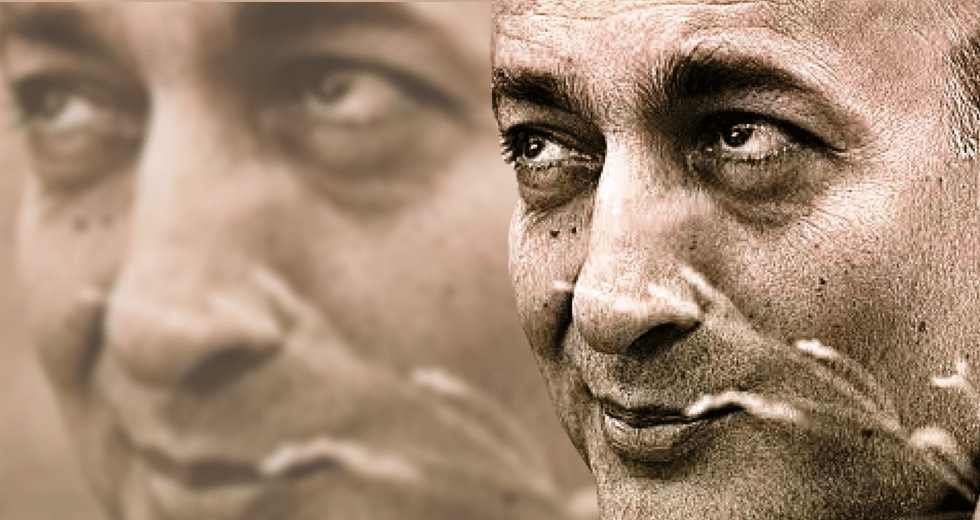
His first collections of verse, short poems written in a classical style, were published in the magazines Nea Estia (1931) and Rythmos (1933). For most of the decade, however, he dedicated himself to reviews and literary criticism. In 1943, during the Nazi occupation of Greece, Gatsos published his major work, the surrealist epic poem Amorgos. Amorgos was soon recognized as a major work, but proved to be the only book Gatsos published in his career. He later published three more poems, Elegeio in 1946, The Knight and Death in 1947 and Song of Old Times in 1963.
Following World War II, Gatsos worked for the Greek British Review as a translator and also for the Greek Radio Television as a translator, arranger and radio director, while he also became involved in translating theatrical plays for the National Theatre of Greece, the Art Theatre and the Folk Theatre. After part of Amorgos was set to music by Manos Hadzidakis, he established a new and influential role as a lyricist for Greece’s most popular composers, notably Hadzidakis, Theodorakis, Xarhakos, among others. Many of his songs are of great beauty and clarity, and helped to introduce a rare quality into Greek popular music.
In later years Gatsos established himself as a unique literary figure in Greece. Holding court in various Athenian cafés, he attracted intellectuals and writers, both foreign and Greek, and gave firm but gentle guidance to aspiring poets. In 1987, he was honoured with the Municipality of Athens Award and in 1991 he was elected corresponding member of the Academy of Barcelona. He died in Athens in 1992, and was buried in the village of his birth, as he had requested.
A.R.
TAGS: LITERATURE & BOOKS | READING GREECE


